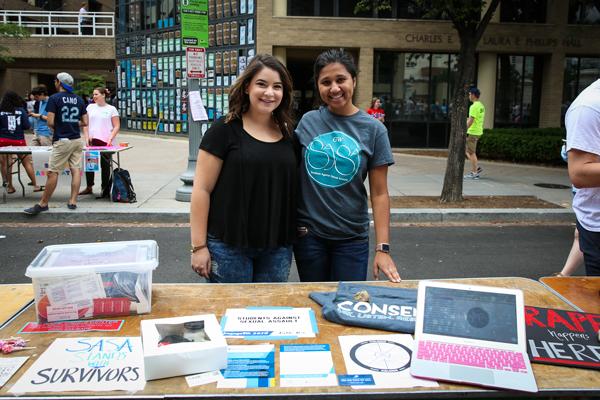Students Against Sexual Assault is adding more peer educators to run sexual assault prevention trainings.
The organization’s executive board members will finish training about 20 students to become peer educators this semester after more student groups have requested trainings, the organization’s leaders said. SASA will also increase its outreach to multicultural and LGBT students by adding new executive board members to work with those communities this academic year.
Jocelyn Jacoby, the co-president of SASA, said the group decided to add more peer educators in response to a steady increase in the number of training requests over the past two years.
“A good problem to have is that we were requested [for] a lot of workshops and don’t have the manpower to do it all,” Jacoby said. “Part of our solution was creating a peer education committee, which is also another way of getting our general body members involved.”
Previously, only members of the group’s executive board led the trainings. SASA executive board members have been professionally trained by Carrie Ross, GW’s assistant director for sexual assault prevention and response, and members of the Rape Abuse Incest National Network. Jacoby said executive board members will be the ones to train new peer educators.
When Jacoby was a freshman four years ago, SASA was only about eight members sitting around a table, she said. Four years later, the organization has 30 to 40 students at every general body meeting and more members who want to take on larger roles within the organization.
The student organization started offering trainings to other student groups two years ago, and a larger number of GW student organizations around campus were interested in signing up for sexual assault prevention and bystander intervention training sessions from SASA last year.
Members training to be educators participate in a workshop, watch a presentation from SASA executive board members and then present a sample presentation to the board.
The group hopes to recruit more potential peer educators, including freshmen, this semester, Jacoby said.
“We are hoping to let these people lead these workshops all on their own,” Jacoby said. “I love leading workshops so I really want to give that opportunity to other people as well.”
Kalpana Vissa, the co-president of SASA, said the group has primarily trained Greek life and athletic groups but wants to expand to religious, LGBT and multicultural organizations this year.
“We just want to keep educating — education will in turn lead to prevention,” Vissa said. “We have really expanded our group, and this year we would like to give them more ownership.”
SASA is adding four new positions to their executive board to help reach more students: an intersectionality chair, a freshman representative, a director of policy and a public relations chair, Vissa said.
Vissa said the intersectionality chair will build partnerships with student organizations, especially multicultural groups, and that the freshman representative will give first-year students the chance to be more engaged and hold leadership positions.
This year the Title IX office expanded in-person mandatory sexual assault prevention trainings for incoming students in an effort to tailor the program. SASA will lead one of the workshops available to students.
Michaela Stanch, a lead peer educator for SASA, said when she first came to GW she didn’t have much experience with sex education, and GW’s required trainings and SASA’s workshops could help new students who initially feel overwhelmed.
“Through SASA’s workshops and the new freshmen trainings, students can see that their fellow students care about sexual violence awareness, and it makes the whole issue of sexual violence more approachable,” Stanch said.
Brittany Oliver, a leader at the Monument Quilt, an organization that promotes healing for survivors of rape and abuse, said student advocates can make other students more open about their experiences. Workshops led by students can encourage others to become advocates and leaders, too, she said.
“Students teaching other students gives them more responsibility, and it becomes more relatable,” Oliver said. “It helps students to come out to tell their stories.”







